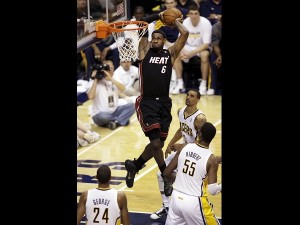
“JORDANESQUE” MOVES. Miami Heat forward LeBron James (6) dunks in front of Indiana Pacers' George Hill (3), Roy Hibbert (55) and Paul George (24) during the second half of Game 4 of their NBA basketball Eastern Conference semifinal playoff series, Sunday, May 20, 2012, in Indianapolis. AP/AJ Mast
Spectacular as it seemed, it was nothing we haven’t seen from LeBron James before.
Maybe that’s the funny thing about all the hoopla over James’ performance in Game 4 of the Pacers-Heat playoff series. Because for once, it wasn’t just his talent that deserved the spotlight, but his maturity. The question, after all, was never how good James was; he answered that long before his fateful decision to leave Cleveland for Miami turned James into the superstar everybody loves to hate.
He won a scoring championship, back-to-back Most Valuable Player awards and single-handedly dragged the Cavaliers into the playoffs each of his last five seasons there — and still had enough energy left to deliver a handful of postseason performances every bit as eye-popping as the one he dropped Sunday on Indiana. People forget that now.
In 2007, James scored 48 points, including all of his team’s last 25, in a double-overtime victory over Detroit. Former NBA sharpshooter Steve Kerr, who played alongside Michael Jordan and was doing the color commentary that night, bestowed the ultimate compliment that night: “Jordanesque.”
In 2009, James put up 41, 44 and 37 points in consecutive games against Orlando. Over those five postseasons with the Cavs, he averaged 43 minutes and 30 points. Somehow, it was never enough.
So it’s worth remembering the reason that Jordan, Charles Barkley and a handful of other NBA greats — plus nearly every NBA fan outside Miami — turned thumbs-down on James’ decision to leave Cleveland in the first place. They simply thought he was too good and too young to go looking for so much help so soon.
To say James should have developed a sense of urgency since doesn’t tell the half of it. He’s 27 and still without a ring after the first season of the “Big Three” experiment ended in failure against the Dallas Mavericks. So when Chris Bosh went down in the first game of the series against Indiana, and Miami’s response was two shaky losses in a row, everybody was quick to drop the blame into LeBron’s lap instead of where it squarely belonged — on Dwyane Wade’s shoulders.
It’s one measure of how much James may have matured that he took the criticism in silence. Usually, he finds no slight too small to ignore and he’s had so many public feuds running at any moment that it’s hard to keep track of them all. Earlier this season, he correctly pointed out, “If someone wants to get a point across — just throw LeBron’s name in there. You could be watching cartoons with your kids and you don’t like it, you say, ‘Blame it on LeBron.’ If you go to the grocery store and they don’t have the milk that you like, you just say, ‘It’s LeBron’s fault.’ ”
And so it seemed likely to happen again this postseason as the Heat’s tailspin — and Wade’s funk — continued through the early going in Game 4.
Consistency comes when people know what’s expected of them. And despite two-plus seasons trying to make their talents mesh, James’ supporting cast in Miami is finding it just as hard as the one he left behind in Cleveland to figure out what their roles are when the star of the show is still trying to decide what his is going to be. For this one game, at least, James erased all doubts by doing just about everything. He scored down low, knifed through the lane, blocked shots, defended the post, brought the ball up — anything and everything Miami needed to stay within touch of the Pacers.
Just before halftime, with 19 points of his own, he fired off an assist to set Wade up for a dunk that may have reversed the momentum in the series for good. That one pass said more than any pregame pep talk James may have considered.
“I didn’t say anything to him for a reason,” James recalled afterward. “He’s one of the best players in the world, but I know that the best thing for a scorer who’s struggling is to get him an easy one.”
“When ‘Bron gave it back to me, I caught it in rhythm and you could tell I wasn’t thinking of anything,” Wade confirmed. “I was just playing basketball again.”
The two combined for 70 of Miami’s 100 points — 40 for James; 30 by Wade — including 38 straight at one point. Wade had 10 in a row by himself. Even Udonis Haslem got into the act, doing a passable imitation of Bosh in the paint.
“I felt like I had to do whatever it takes for us to win,” James said.
Yet the difference between James trying to do it all himself in Cleveland and Miami wasn’t apparent until the end. It was only then that Wade realized he’d already spent too many minutes doing what James’ teammates have been doing since LeBron first wrapped his hands around the ball: Watching.
“We played off each other really well. We were both,” Wade said almost sheepishly, “aggressive at the same time.”
Jim Litke is a national sports columnist for The Associated Press.